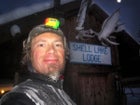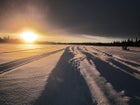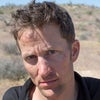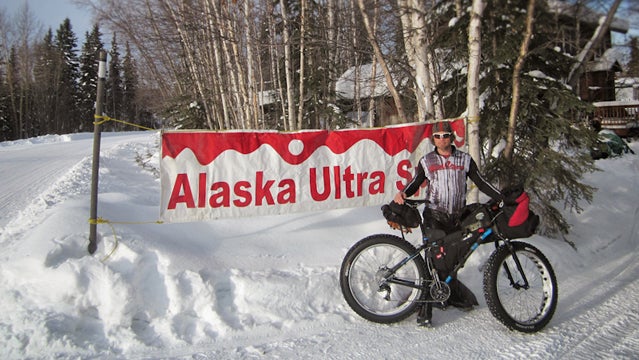Jay Petervary seems to break a record at nearly every endurance event he enters. The Victor, Idaho, native did it again a few weeks ago with a gutsy and savvy ride at the . Petervary completed the 350-mile race from Knik Lake to McGrath in two days, 19 hours, and 16 minutes, smashing the 2007 record by over nine hours. Rookie Tim Bernston and past-winner Jeff Oatley finished at 34 and 56 minutes respectively, though the favorable weather and trail conditions that contributed to Petervary’s achievement meant that all seven of the top racers finished faster than the previous record time. The new record is the second of Petervary’s Alaskan haul. In 2011 he set the fast time of 17 days and six hours on the 1,100-mile Iditarod race to Nome.


These numbers don’t give a full picture of the monumental effort and drive that it takes to participate in—much less win—an ITI event. In the Iditarod, racers travel long stretches between checkpoints through isolated and rugged Alaskan wilderness. Snow conditions can turn much of the riding into extended sections of arduous post-holing, and riders must carry food, clothing, gear, and safety equipment to tough it out in -50-degree Fahrenheit blizzard conditions should the weather turn. To top it all off, Petervary competed this year with a broken ankle. The Iditarod, with its brutal weather, unpredictable trail conditions, and thoroughly remote access makes a race like the 2,700-mile Tour Divide from Canada to Mexico—a warm-weather course that Petervary set the record on last summer—look gentle.
We caught up with Petervary at his home in Idaho a few weeks after the race to see how he was recuperating, hear his account of the event, and find out if there’s anything out there big enough to challenge him.
Congratulations. You obliterated the record. Did you go in chasing that?
I think that simply completing any one of those routes is an awesome accomplishment. It’s such a unique event. I don’t go into it ever thinking a record is available. It all has to do with weather. In a snow race, one big storm and an eight-hour stretch could turn into 24 hours.
Now you have the record in the 350-mile “short” race and the south route of the 1,100-mile race. That leaves just one.
Yeah, next year is the north route. They alternate north and south each year on the long course. I can’t say it’s the goal to get the . If that comes, great. All you can do is go prepared and do the best you can. If you are focused and you’re a racer and you want to go for the win, that’s OK. But I don’t think you want to set your goals too high and say you’re chasing a record. The minute you’re behind your expectations, you get down on yourself and get negative. As soon as you get down on yourself and begin questioning your ability in an effort like this, it can kill you.
How did this year’s race unfold?
I don’t even call them races anymore. I call them Big Boy games. The start of the event was the typical style of snow. It was really slow, and we were immediately pushing across the lake. The first 24 hours were slow, but it just got better and faster. There were four guys who were racing together at the front of the race. They traveled as a pod. There was Jeff Oatley, a veteran, and three rookies.
Early in the race, I tried making one move. At one of the cabins, while the guys were sitting down to eat and dry out, I walked out as soon as we checked in and went up the trail and made my breakfast there. I just wanted to see how they would react. I got to the next cabin only a few minutes ahead of them. It made me realize that their physical ability was greater than mine. I wasn’t going to be able to just shake these guys. Fitness wasn’t going to win it; it was going to be a strategy game. So the race turned into a game of patience, which is tough for me because it’s not usually my style. I like to be out front setting the pace. But I knew I had to wait.
So what did you do?
I purposely traveled five minutes behind these guys. Anytime you are traveling as a group, you go slower. When the other guy takes a stop to pee or wants a food break, you feel like you have to stop, too. You take on this group dynamic. I don’t mind that, but I was there competing not on a tour with my friends. So I would purposely stay back. Ultimately I would catch them on the trail because they’d be stopping for whatever reason, and then I would just hang back. I was also more comfortable this way because I was feeling my way, testing my broken ankle.
Wait, you had a broken ankle?
Yes. I didn’t decide ’til very late that I was going to do the Ultra Sport. There is a waiting list for the event and when some people dropped out, I got the opportunity. That was three weeks before the event. Two days later, I broke my ankle while I was backcountry skiing. It wasn’t displaced that much, and it wasn’t in the meat of the bone where they could put hardware. But it still filled me with doubt. I gave it a week to see what happened, and I went for another x-ray and they saw bone growth. I believe strongly in the mind-body connection and what a body can do. And when I saw that I could move around, I started believing that I could do it. Once something gets in my mind like that, I just have to make it work. So I started with my ankle wrapped and in a lace-up brace. Thursday will be seven weeks.
Okay, so back to the race—with your broken ankle.
Everyone is saying: “Wow, you broke the record by nine hours. It must have been like concrete out there.” It was faster than normal, but it wasn’t concrete. It was still heavy. It’s power riding, the stuff that grinds hard on your knees and takes constant pressure and really wears you down. The difference this year, though, was how consistent things were. There were no epic temperature swings. And whereas most years there’s an epic section, that didn’t happen this year. Over Rainey Pass, at 160 miles, you confront the Alaska Range. It is a stretch that typically takes 15 hours. I’ve taken as long as 30 hours to do it. This year it took just eight hours. So we were powering along. I feel badly for any rookies who come out and think that this year is normal and then have to go back out next year and find temperatures down to -40 degrees Fahrenheit and long stretches of pushing your bike.
So what eventually broke up the race?
I knew what was going to happen going into Nikolai, the very last checkpoint at mile 300. We all rode in together, and I knew Jeff Oatley was thinking about what to do. I already knew what I was going to do. Before the race I decided that I wasn’t going to sleep this race. It was 1 a.m. and I got my meal, and I never took off my clothes. The rookies were questioning what they were going to do, what they should do. And then the sleep monster got Jeff. He fell asleep at the table. And those other guys just sort of took that on. They didn’t know what lay ahead, so they decided to sleep, too. I knew that was the moment. I was at Nikolai less than half an hour. I just pushed through and back out onto the trail. They were there almost three hours. That was the race.
You hadn’t slept for nearly 60 hours and you pushed on? Weren’t you afraid that those guys would rest up and catch you?
Definitely. Yes. I knew going out on that last section that Jeff could crush me on it. In previous years he has made up lots of time on that stretch. The first two hours I was on the trail, I was in Sleep Monster world. It was ready to bite me. I was moving really slowly and drifting around on the trail. But finally things kicked in. I realized: “Dude, you have this. You can set a record. You need to motivate. If you’re going to get this, you better wake up and start pedaling hard.” And finally I did. I chugged a five-hour energy. I cranked up the music. And I thought awesome thoughts. I was still looking over my shoulder all night, but when the sun came up I got more confident. But it was a push all the way to the end.
They almost caught you, too. Second place Tim Bernston was almost two hours faster than you on that final stretch from Nikolai to McGrath.
I knew it was going to be . There’s this breaking point between the speed that comes with rest and the time you save by skipping sleep. I timed it right. I almost felt badly for the second place guy when he arrived. He was white and panting and just dead from his effort. He said he did everything he could to catch me. But it wasn’t enough. This was definitely the most gratifying race I’ve done. Knowing that I had beaten guys who were clearly fitter than me with good tactics…. I was just shouting and ecstatic when I rolled in.
What’s it like to push so hard while you’ve been awake for so long?
It’s motivating for me. At this point in my experience with these things, sleep deprivation is almost a driver for me. I’ve been doing events like this since just after college, when I was 22, so I have a lot of experience with it. I sort of thrive on it. It’s interesting for me to see how far you can push it. How crazy you can make yourself. I have hallucinated before. You get really weird. You’re moving really slow. You’re swerving from side to side. But it doesn’t scare me like it scares other people because I understand it’s just another challenge. I enjoy the challenge.
Do you think you reached your sleep deprivation limits?
No, no, no. I’m still trying to figure out how far it can go. I’m still waiting for the opportunity to do the Race Across America, where I have to be awake for a week and guys are chasing me down and I’m chasing and I still have to push myself. I think I can go much farther.
You shattered the record by more than nine hours. Was it just the conditions?
The conditions were good. But it was also the cutting out of sleep. That’s the first time I’ve done that in this race. And there’s the competition. The field was stronger than ever before. It just makes you push harder.
And the gear?
The technology of the bikes is ridiculous. The tires are getting bigger and bigger, which makes riding that much easier.
What did you ride?
I was on the new . It’s a full-on, cross-country 29er hardtail—but with fat tires. It feels like a race bike. The front end is so stable and steers great. It feels like a normal 29er. And the rear end tracked and gripped really well. It’s just a well-balanced bike that you don’t have to think about. I ran 100mm Clown Shoe rims, which are the biggest to date. And I had , which are four-inch studded tires. The combination just made it easier to ride. Thinking about steering and balance all the time, those are the things that wear you out in snow biking. If you love your bike and love your gear, you’re going to ride with a big smile, and that’s really important in an event like this. It keeps you fresh.
What gear did you carry?
I went really light. I had a 15F sleeping bag, down tops and bottoms, Gore-Tex tops and bottoms, and a windbreaker. I had a repair kit, a small medical kit. I go heavy on the extremity side: Two extra pairs of socks, a little extra headgear so I can switch out sweaty hats and balaclavas, and the same with gloves. Those are the things that get cold fastest so I like to be careful. But even with bike, kit, and partial food, I was only at 46 pounds, and I can survive at -50 degrees Fahrenheit with that. I’ve done it. The coldest it ever got was -10, but mostly it was 10 to 20 degrees.
Most people would say that’s cold. It seems like a lot of what you do involves deprivation and suffering.
Woah, woah, woah, woah. Suffering is a bad word. We don’t use the s-word. I do not suffer. If you are out there suffering, over and over, you have issues. If I suffered, I wouldn’t do it. I only do things that I want to do. I would never use that word.
But there have to be rough patches?
There are definitely challenging moments. For me, that’s just a part of doing it. I know I will reach those points, and it becomes a question of how will I overcome it. Why am I feeling bad, and what do I do to not feel so bad. For example in the , if I am really tired and I’m pushing myself and pushing myself, I will go to sleep for a few hours. I know from experience that I don’t like being dehydrated—it really hurts—so I work hard to never get to that point. I eat a lot, listen to music, and I always try to remember why I’m out there.
I enjoy riding my bike. Nowadays, I like taking on these challenges. I like to challenge myself. I like to win. But mostly I like to ride my bike. My wife rides mountain bikes, too. When we go on vacation, it’s to ride. This is what we like to do. When you do events like this, where you are pushing so hard, it has to be fun. If you wear out your mind, everything is going to follow. You have to be stoked.
So what else is left?
I’m at a point where I’m not necessarily going to do “events” anymore. I like the individual time trial, the challenge of being out by myself. I would like to do more expedition-style events. I want to take everything I’ve learned over the years and apply it to something that hasn’t been done before. I have a dream of riding around the world. I think about more international stuff, reading more, seeing more of the world. I want to do bigger things.


